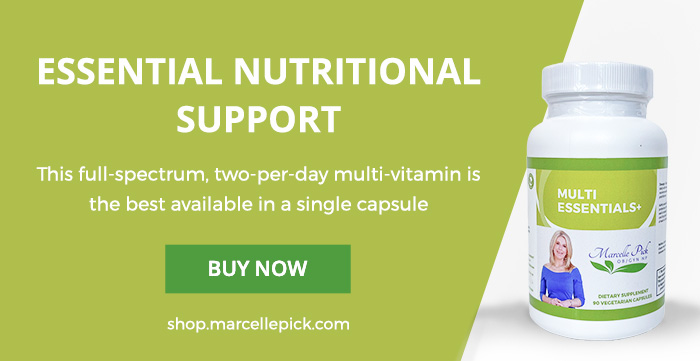Updated 11/13/2022
My heart went out to Carrie as I listened to her story. Holding back tears, she told me that she felt anxious all the time, couldn’t focus, and had terrible symptoms with her monthly cycle.
But worst of all, she said, she’d been trying to get pregnant for more than a year with no success. She’d been to her primary care provider multiple times with the same complaints, but the only suggestion she got was medication – which hadn’t really helped.
I spent a lot of time with Carrie, asking questions about her lifestyle and medical history. From that conversation, I suspected she may be suffering from adrenal fatigue, and I knew I needed to discover what exactly was taking its toll on the adrenal glands. So I ran some tests to check out her hormone levels, and sure enough, her progesterone levels were too low.
Every month, a woman’s body goes to work producing hormones to prepare for the possibility of a pregnancy. Progesterone is produced in the ovaries after the ovulation cycle, getting the uterus ready for a fertilized egg by thickening its lining.
If an egg is fertilized, progesterone helps keep that uterus lining thick throughout the pregnancy. If no egg is fertilized, progesterone levels drop and a new menstrual cycle begins.
Having the right levels of progesterone is critical to both regulating the menstrual cycle and pregnancy. As part of an orchestra of essential hormones, balanced progesterone levels are also important in maintaining overall health. While fluctuations are natural and normal throughout the menstrual cycle, if progesterone levels drop too low, big problems can ensue.
So many women, like Carrie, don’t know how their hormones impact them. They all too easily miss the signs of hormonal imbalances. When they come to me, they’re exhausted and frustrated, knowing they don’t feel like themselves, with no idea what to do about it.
Have you been feeling like Carrie for far too long? Are you frustrated with the response from your healthcare provider? Are you seeking non-pharmaceutical, natural ways to feel better? I can help!
We’ll take a look at progesterone deficiency and its connection to adrenal fatigue, and then I’ll suggest 4 natural ways to balance progesterone levels so you can heal your adrenals. Healthy adrenals lead to a healthy, happy life!
Progesterone deficiency
The primary roles of progesterone are to support pregnancy and regulate the menstrual cycle.
When levels are too low, you’ll have problems with both your regular cycle and fertility. Progesterone deficiency is also a problem for older, menopausal women due to the other symptoms it can cause.
Progesterone is produced in both the ovaries and the adrenal glands. That means that lack of progesterone could be either a contributing factor to adrenal fatigue or a result of adrenal fatigue.
Sounds complicated, doesn’t it? That’s because it is!
An orchestra needs all of its instruments to work together to make a symphony sound right – and your body needs all hormones balanced properly for optimal functioning. When one is out of whack, others will struggle to compensate but can quickly become imbalanced as well. The natural healing tips I’ll give you later work on all of these imbalances to get you back to good health.
What are some signs of progesterone deficiency?
The typical signs of adrenal fatigue are also common signs that progesterone is too low. That’s because it’s all connected! Some of the typical symptoms women will have when dealing with progesterone deficiency include:
- Migraines/headaches
- Mood difficulties, including irritability, mood swings, anxiety and depression
- Sleep issues
- Bloating, water retention, vaginal dryness, infertility, PMS and/or irregular periods
- No sex drive
- Acne, facial hair growth, hair loss, dry skin, brittle nails
- Exhaustion
- Fuzzy thinking
- Sugar cravings
- Weight gain
Root Causes of Progesterone Deficiency
As with any hormonal imbalance, there are many reasons a woman may find her progesterone levels dropping too low. Levels natural decrease as a woman ages. But one of the biggest reasons for low progesterone is stress — just like in adrenal fatigue.
Your body is designed to balance its own hormones. Progesterone should be balanced by estrogen. But if estrogen takes over, big problems ensue.
And there are so many factors that contribute to estrogen dominance, including chemicals in the environment, hormone replacement therapy, the food we eat, and stress. A hysterectomy or oophorectomy can also cause a substantial dip in progesterone production.
Stress, progesterone and adrenal fatigue
Our bodies are prepared to respond to stress – but not to the constant barrage we face in our lives these days. Adrenal fatigue, while controversial among conventional practitioners, is widely recognized in the functional medicine world as a major health problem.
The stress response is natural and necessary, but is designed to be a short term response. Your body should perceive a threat, prepare to deal with it, deal with it, and then relax. The problem is that our bodies perceive all stress the same way, and these days, stress is everywhere. That means your body never has a chance to relax!
While you may know that a traffic jam isn’t a problem that requires a fight or flight response, your body doesn’t. That’s why road rage happens!
Chronic stress taxes the adrenals and eventually makes it nearly impossible for them to do their job right. The constant perception of a threat to survival calls for increasing amounts of cortisol.
When the demand for cortisol is too high Progesterone is not produced in the same manner, as cortisol is essential for life and progesterone is not. When your adrenals are working overtime to produce cortisol, this can create an imbalance between estrogen and progesterone. As there is less production of both.
What can I do about progesterone deficiency?
Conventional medicine often defaults to treating symptoms without finding the cause of those symptoms. But when you don’t know where a symptom originates, treatments may not do what you hope.
Remember Carrie? She tried the medications her doctor suggested, but they didn’t really help. And as soon as she stopped taking them, the little relief she had found disappeared.
It may seem as though progesterone replacement is the answer, but synthetic hormones can actually make the problem worse. That’s why I always recommend natural solutions first. Here are four things that can help balance progesterone and heal adrenal fatigue naturally.
Reducing stress
It isn’t easy, but reducing stress may be the most important thing you can do to balance all of the hormones in your body. Finding ways each and every day to eliminate (or at the very least decrease) the stress response in your life is essential to good health.
When you reduce the stress coming at your body, you give your adrenals a break. While you won’t be able to eliminate all of the stress in your life (and honestly, you need some stress to keep that protective stress response working well), there are many things you can do to reduce the constant stream of stress so many of us face every day.
First and foremost, take time every single day to simply breathe deeply. So often, our breathing becomes shallow and we don’t even notice. When that happens, we aren’t giving our bodies the oxygen it needs!
Take some time first thing in the morning, then periodically throughout the day, to stop and take some conscious deep breaths. You can do it, while while waiting at stoplights, in supermarket lines, even in meetings when someone else is talking. No one around you will know, and you might be amazed at how calm and serene you feel afterwards.
Make a list of your own personal stressors, then look to see if you can change just one of them. Slowly work your way through the list until you’ve found ways to reduce the amount of stress each one produces.
For instance, if getting your toddler ready to leave the house in the morning is a huge source of stress for you, can you ask your partner for help? Prepare some things the night before to make the transition easier? Sometimes, just knowing the things that are adding stress to your life can make a big difference in how you perceive them.
Don’t forget to pay attention to emotional stress. Physical stressors can be more obvious, but often it’s the emotional trauma we’re carrying that sends our bodies spiraling. Reach out for help from a trusted friend or counselor if necessary, to help you process the emotional turmoil that could be eroding your health.
Find an activity that calms your mind and makes you feel great. For some, that’s yoga or meditation. Others prefer more active options, like walking, biking, swimming or dancing. Whatever it is, make sure you LOVE it! Even just a few minutes can make a big difference.
I have one friend who sets an alarm for noon every day. Wherever she is, she stops what she’s doing, plays a song she loves, and has her own personal dance party. She says it makes an amazing difference in how she functions for the rest of the day!
Eat for optimal hormone health
Food is absolutely the most powerful medicine we have. But our culture, especially in the US, has drifted way too far from what we know is good for our bodies.
It’s best to choose organic whole foods whenever possible. Balance proteins, healthy fats, and carbohydrates appropriately. Avoid processed foods and sugar as much as possible. A wide variety of fruits and vegetables are an essential part of a healthy diet.
Our food can provide many important vitamins important to maintaining appropriate progesterone levels. For vitamin B6, eat lean red meat, seafood, potatoes, beans, whole grains, spinach and walnuts. Vitamin C is present in dark green leafy vegetables, citrus fruits, yellow peppers, and broccoli.
Good sources of magnesium include fish, dark chocolate, and dark green leafy vegetables. For zinc, eat shellfish, pumpkin seeds, cashews and red meat.
Pay close attention to when you are eating as well. Going too long without food can really tax your body, and low blood sugar can make you irritable, unfocused, and tired.
Support your body with supplements
Vitamins B and C are helpful when it comes to boosting progesterone levels. Vitamin B6, specifically, helps your body produce optimal levels of progesterone.
B6 also helps break down estrogen in the liver, reducing the chance of estrogen dominance. Vitamin C is an antioxidant that fights free radicals which can damage cells.
Magnesium and Zinc are also critical components in maintaining healthy progesterone levels. Magnesium helps to regulate hormone levels.
A deficiency in magnesium won’t allow your body to produce the hormones you need to keep things functioning at an optimal level. Zinc signals the pituitary gland to release hormones that promote ovulation and simultaneously promote progesterone production in the ovaries.
A high quality multivitamin can provide all of these critical vitamins and minerals. If adrenal fatigue is severe, targeted supplementation may also be necessary. It’s critical to work with a qualified healthcare professional to find the supplements that meet your needs.
Before taking supplements, always check in with your provider to be sure they’re appropriate for your unique situation. As with most things, one size does not fit all. Dosages may vary depending on your personal circumstances, and testing may be necessary to determine what’s right for you.
Bioidentical progesterone cream
When other efforts fail, you may need a little hormone boost. Unlike synthetic hormones, bioidentical hormones have the same cellular structure as the progesterone your body produces naturally. These creams are easily absorbed and can be quite effective in increasing progesterone levels. It’s critical, however, to avoid creams that also contain estrogen!
If you’ve already reached a state of adrenal fatigue, you’ll want to be careful with using these creams, as added progesterone may not be easily processed by your liver.
The last thing you want to do is make things worse! You may want to check with a functional medical practitioner to find out your levels and get the progesterone that you may need.
Natural hormonal balance is the key to a healthy, happy life
Progesterone is just one important member of the hormonal orchestra.
Balancing all of your hormones allows your body to enjoy the harmony that results when that orchestra is in sync. The good news is that most of the suggestions for keeping progesterone levels where they should be can also help keep other hormone levels balanced.
When I ran tests, we discovered that Carrie was, indeed, low in progesterone. She tried my four suggestions and reported amazing results within just a few weeks.
Best of all, after a couple of months of shifting her lifestyle with these natural suggestions, she called to report that she was pregnant! Carrie knew that she shouldn’t have to live the way she’d been living, and found the help that she needed to live her best life. Don’t you want that too?








